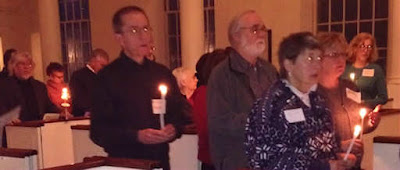Did
you ever see a movie or read a book for a second time? The first time, one wrestles with the novelty,
the unknown, the sequence of thought, meaning and actions. The second time around, there is no need to concentrate
on the story line. One is freer to
concentrate on nuances, shades of meaning, subtleties, word plays and other
characteristics since the story line is known beforehand.
That
is our starting point as we enter into Holy Week. We know the story’s plot, laid out by the
sequence of events reenacted on Passion Sunday, Holy Wednesday, Maundy
Thursday, Good Friday and Easter. We
know that we enter Jerusalem with exuberance and uplifted spirits, to be followed
by the horrifying sequence of events leading to Christ being hung on a tree to
die. And we all know the happy and
triumphant outcome that follows in our Lord’s rising three days later.
Time
out! Not so fast! As the Holy Week drama
unfolds, we must straddle a gaping hole of death, suffering, and grief, before
the blessed joy of Christ’s Resurrection.
We
must be immersed in an I-Max three-dimensional panorama of death and fear. It
is beyond disgusting. There are bones
all over, the place reeks of death and putrid blood and body parts; dogs and
vultures are feeding on the carcasses lying about. This depressing pit,
Golgotha, is filled with countless shrieks of terror, torture and gore. This is the place where the ruthless Romans
torture any rabble-rouser, criminal and the scum of the earth to be nailed to
trees to writhe in pain for hours, to be laughed at humiliated and to die in
disgrace. And then to rot! This is a totally disgusting, scandalous, putrid
and gruesome dump.
Good
Friday! Death! I sink to the depths of
despair and existential emptiness as I listen to the last words of Christ, and
the refutation of his entire ministry. I hear the hammer hitting the head of
the nail; the nail that punctures and gores Christ’s tender flesh before
reaching the hard wood of the cross to where he will be affixed so as to suffer
a most excruciating death. His last three
hours are an eternity. I am in abject
despair. There is no up or down, past or
future, happiness and sadness; just emptiness, listlessness and paralysis.
Oh,
if only we could “fast-forward” to Easter and the celebratory joy that we know
is awaiting us once we get past this horrific chapter of the Passion narrative. No can do!
We must remain for a while steeped in the deepest depths of death, scandal,
terror and suffering first, horrifying beyond all comprehension.
I
see, by extension, my own life—my past, present and future—conforming to the
story line of Christ’s life with its ups and downs, joys and despair. Death, mine and yours included, is the only
looming certainty and this is what I am fixating on right now.
Following
this story line—yours, mine and that of Jesus Christ—provides the framework for
being assured that whatever the roadmap of our lives look like, the end destination—a.k.a.
death—will transition us to our sacred eternal home. Like
Christ, we will follow along, after death, just as we followed his footsteps
during life.
In
this post-Enlightenment world where “reality” needs to be verified and proven,
the joy and reassurance that death is not the definitive last word to the story
line—the Resurrection—is taken on faith.
Faith in the life hereafter is the climax and outcome of our jointly-shared
the story line. It is the Christian
hope. How amazing is that?
*
* *
Recently,
I had the honor to serve the Chalice to a parishioner in my church. She was a week away from death’s door. She knew it; cancer allows for this
understanding to sink in. Was she
terrified? She must have been as I am
certain I will be when my time comes.
But, here is the thing. When
taking the Chalice to her lips, our eyes met.
Through the ravages of cancer and excruciating pain, her eyes were
dancing with joy and celebration of the Eucharist. Her spiritual bags were already packed for the
journey ahead. I could very palpably
FEEL it.
This
lovely parishioner passed away a week later.
Very saddened, I attended her memorial service. Her death was a painful
loss; nothing takes the sting out of death.
Not even the comfort of knowing that death transitions to triumph and
eternal peace.
However,
her joyfully-dancing eyes that last week, as she drank Christ’s sustaining Blood,
testifies to the fact that she knew where she was going, prepared emotionally and
spiritually. And I take comfort having experienced
and shared this insightful moment that reassures me she is now in a place where
death is conquered and nothing worse can possibly happen to her, or any of us
for that matter. She is blessedly safe.
*
* *
Next
year, I will have a different experience and “take” of Holy Week. But I know it will be under the same story
line of our Christian faith and, by extension, our lives.
Simply
amazing as I gaze at that horrid Cross and the vacuous emptiness that surrounds
it.
James
A Harrison



